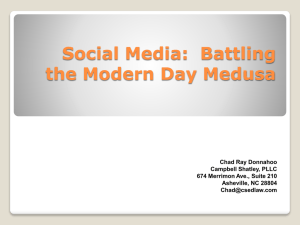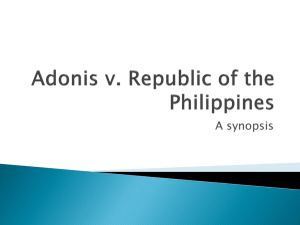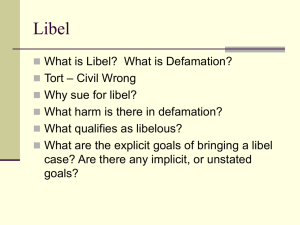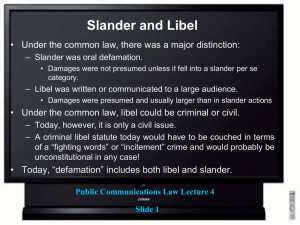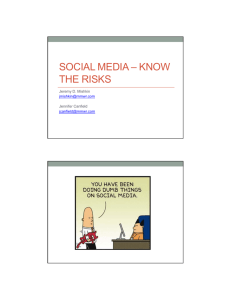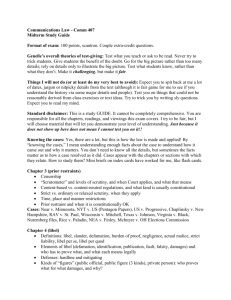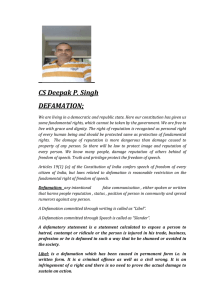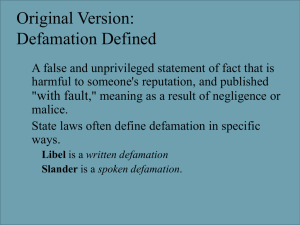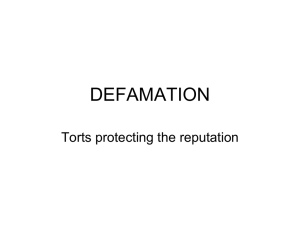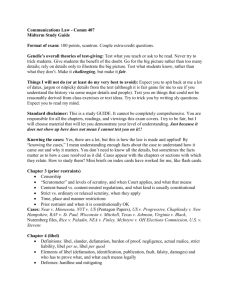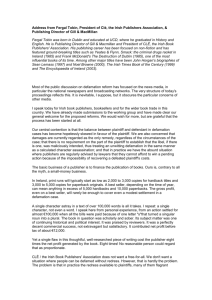Social Media: Battling the Modern Day Medusa
advertisement
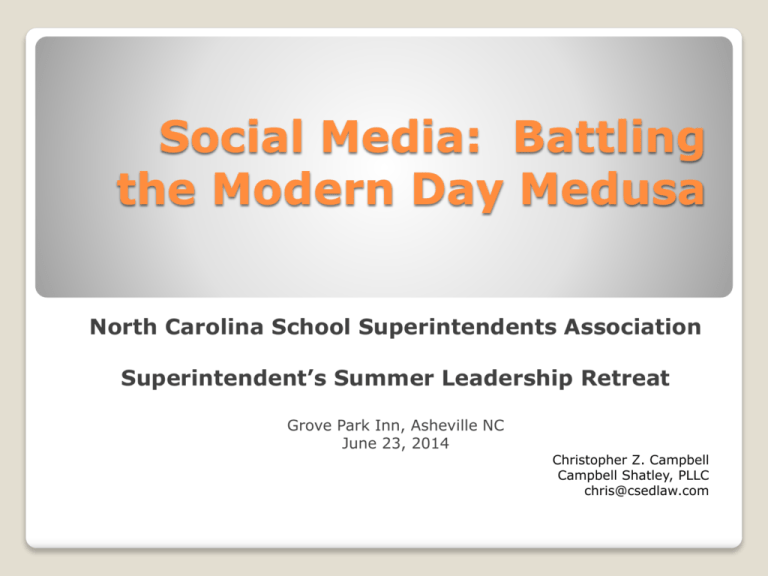
Social Media: Battling the Modern Day Medusa North Carolina School Superintendents Association Superintendent’s Summer Leadership Retreat Grove Park Inn, Asheville NC June 23, 2014 Christopher Z. Campbell Campbell Shatley, PLLC chris@csedlaw.com Social Media: We Can’t Help But Look at It! The Snakes that Can Bite! Twitter Facebook Instagram Flickr Tumblr The Venom! Defamation Cyber-bullying Insubordination The Mirrored Shield Deal with the ISSUE NOT the form of Social Media Defamation against You or Slander Against the School System Is the posting legally actionable? Law of “Twibel” Libel (written defamation) + Twitter (i.e. any social posting) = Twibel Legal Test is the same for libel no matter the venue with one important exception Libel = Tort A written statement that is false and tends to malign the Plaintiff in his or her profession or business or disparage the Plaintiff’s integrity in his or her profession or business. Types of Libel: Per se – obviously defamatory Statements subject to two legitimate interpretations, one defamatory and one not. Per quod – requires external evidence to become defamatory Twibel Elements for Libel in general = 1) A written statement that is false and tends to malign the Plaintiff in his or her profession or business. 2) The statement must be “published” to a third party who understands its meaning. 3) Statement must assert actual facts instead of rhetorical hyperbole and expressions of opinion Twibel 4) The cause of action belongs to individuals and corporations. However, could a Board of Education ever be a successful plaintiff in a lawsuit for defamation? 5) If per se, nominal damages of $1 are available to the Plaintiff even if actual damages are not proven. 6) Otherwise, actual damages resulting from the publication must be proven! Twibel Elements for Libel against a public official or limited public figure = 1) A defendant published false statements, 2) The statements were defamatory, 3) The statements were of or concerning the plaintiff, 4) The statements were published to a third person, Twibel 5) The publication caused special damage to plaintiff, and 6) Defendant did so with actual malice; that is, “with knowledge that the statements were false or with reckless disregard of whether they were false or not. Who is a “Public Official or Public Figure” in Twibel Cases According to the United States Supreme Court: “[T]he ‘public official’ designation applies at the very least to those among the hierarchy of government employees who have, or appear to the public to have, substantial responsibility for or control over the conduct of governmental affairs.” Cline v. Brown, 24 N.C.App. 209, 214, 210 S.E.2d 446, 449 (1974), cert. denied 286 N.C. 412, 211 S.E.2d 793 (1975) (quoting Rosenblatt v. Baer, 383 U.S. 75, 86 S.Ct. 669, 15 L.Ed.2d 597 (1966)). This means YOU! Who is a “Public Official or Public Figure” in Twibel Cases P.S. Public figure includes individuals who have achieved total notoriety in a public context or voluntarily assert themselves into a central role in a particular public controversy (i.e. “limited public figure”). Federal Protection for Social Media Providers Section 230 of the Federal Communications Decency Act of 1996 No provider or user of an interactive computer service shall be treated as the publisher or speaker of any information provided by another information content provider. No cause of action may be brought and no liability may be imposed under any State or local law that is inconsistent with this section. "interactive computer service" means any information service, system, or access software provider that provides or enables computer access by multiple users to a computer server. Bottom-line: The Snakes in Medusa’s Head are NOT to blame (at least not in court) Social media sites that allow postings without materially editing the content of those postings cannot be sued for defamation. Thus, social media sites have the protections of common law “distributors” of information as opposed to “publishers” of information. This means that social media sites do NOT have to remove defamatory content even after notification. Advice regarding Defamation and Social Media 1) You don’t have a mirrored shield and you can’t cut off the head of Medusa. 2) If you truly believe you have been defamed and financially harmed in your professional career, seek an attorney’s opinion. 3) Stop and think: “Do I really want to prove that this person damaged me?” Advice regarding Defamation and Social Media 4) Although the School Board may hire an attorney to initially advise it and you, the School Board is under no legal or policy obligation to pay for a lawsuit on your behalf. The general rule is that employees must file their own lawsuits since public money is involved. 5) Instead of legal action, focus on what you can control! Advice regarding Defamation and Social Media 6) Questions and actions? a) b) c) d) e) Are people reading this stuff? Is it believable? Is the person posting credible? Is this a matter of public concern? Who is damaged, if anyone? Fight Back! Fight Back! 1) If a response is needed, make it targeted to the audience you care about. 2) Options include: a) Individual phone calls, emails or letters b) Cease and desist letter from School Attorney or private attorney c) Responsive postings on the same social media site d) Blocking offenders if you or the school system controls the site, i.e. FaceBook Student Cyber-bullying A National Epidemic? Doesn’t matter because perception is reality. What is it? Unique Characteristics 1.Anonymity 2.Accessibility 3.Punitive fears 4.Bystanders 5.Disinhibition What is it? Common Forms 1.Harassment 2.Denigration 3.Flaming 4.Impersonation 5.Outing & trickery 6.Cyber stalking What is it? Warning Signs 1.Appears sad, moody or anxious 2.Avoids school 3.Withdraws from or shows a lack of interest in social activities 4.Experiences drop in grades - decline in academic performance 5.Appears upset after using computer or being online 6.Appears upset after viewing text message on cell phone How to battle? 1) Investigate, investigate, investigate 2) Catch it early 3) Involve parents for “help” 4) Better use of filtering/ monitoring software? Responding to Parent Postings about Students 1) Investigate, investigate, investigate 2) Catch it early 3) Involve parents for “help” 4) Better use of filtering/ monitoring software? FERPA “don’t go there” Letter to Wagoner, from LeRoy S. Rooker, Director, Family Policy Compliance Office, March 10, 1999. FERPA does permit the nonconsensual disclosure of information from education records in certain limited circumstances. However, none of these circumstances permits nonconsensual disclosure of education records to the public, even if a parent or student has made certain claims in public about the educational agency or institution or certain of its employees or representatives. This restriction applies to educational agencies and institutions even if the information could be obtained from another source. Letter to Wagoner, from LeRoy S. Rooker, Director, Family Policy Compliance Office, March 10, 1999. Moreover, verification or confirmation of facts contained in or which constitute education records without prior written consent violates FERPA because it requires disclosure of personally identifiable information from an education record, or at the least, a reliance on information contained in education records. The District expressed in its response that you made an effort to only discuss information that was public knowledge. For future reference, when the District has a media inquiry of this nature, this Office would always advise that the parents provide consent for the disclosure. Letter to Wagoner, from LeRoy S. Rooker, Director, Family Policy Compliance Office, March 10, 1999. Accordingly, in a situation where the District receives a request from the media and wishes to respond, the District should indicate that FERPA restricts the disclosure of information from education records, and that in order to discuss any details from such records, the parents will have to provide their prior written consent. The District may want to add that it would be free to discuss information from education records after it receives the parents' written consent to do so. Duck, Pivot & Punch Duck and Pivot: “In accordance with federal law we cannot discuss specific student matters. However, we take student safety very seriously and work hand-in-hand with law enforcement anytime a serious issue arises. In addition, school policies allow for short and long term suspensions of students when necessary to maintain order and safety in our schools.” Punch: “We know of no current safety issues at the High School.” Employee Confidentiality South Carolina Employee Privacy SECTION 30-4-40. Matters exempt from disclosure. (a) A public body may but is not required to exempt from disclosure the following information:… (2) Information of a personal nature where the public disclosure thereof would constitute unreasonable invasion of personal privacy…. Employee Confidentiality North Carolina Employee Privacy § 115C-320. Certain records open to inspection. (a) Each local board of education shall maintain a record of each of its employees, showing the following information with respect to each employee: (1) Name. (2) Age. (3) Date of original employment or appointment. (4) The terms of any contract by which the employee is employed whether written or oral, past and current, to the extent that the board has the written contract or a record of the oral contract in its possession. Employee Confidentiality (5) (6) (7) (8) Current position. Title. Current salary. Date and amount of each increase or decrease in salary with that local board of education. (9) Date and type of each promotion, demotion, transfer, suspension, separation, or other change in position classification with that local board of education. (10) Date and general description of the reasons for each promotion with that local board of education. Employee Confidentiality (11) Date and type of each dismissal, suspension, or demotion for disciplinary reasons taken by the local board of education. If the disciplinary action was a dismissal, a copy of the written notice of the final decision of the local board education setting forth the specific acts or omissions that are the basis of the dismissal. (12) The office or station to which the employee is currently assigned. (b) For the purposes of this section, the term "salary" includes pay, benefits, incentives, bonuses, and deferred and all other forms of compensation paid by the employing entity. Top Ten Common Sense Rules for the Appropriate Use of Social Media 10. Do not engage in private social media activities while on the clock. If it would be inappropriate to take a phone call, it is inappropriate to text or email. 9. Do not discuss issues of a controversial nature in “public spaces” online (i.e. pages that can be accessed by lots of folks). Remember, it’s not a crime for others to show your FaceBook postings to the World . . . and your boss! 8. Do not bad mouth students in cyberspace! 7. Do not bad mouth parents in cyberspace! 6. Do not bad mouth co-workers or your bosses in cyberspace! There is no “free speech” protection when you are griping about your boss. Top Ten Common Sense Rules for the Appropriate Use of Social Media 5. Do not post photos that you would be embarrassed to see on a billboard in your hometown. Your “friends” will show these photos to the World . . . and your boss. 4. Cyber and electronic communications between employees and students should never be of a personal nature. The school system hires school counselors if a student is in crisis. 3. Do not engage in cyber or electronic communications with students at all unless their parents and your boss know about it and approve of the practice. 2. If a student contacts you privately using cyber or electronic communications tell them not to in the future and make sure your boss knows it happened. Top Ten Common Sense Rules for the Appropriate Use of Social Media 1. Don’t be a fool on FaceBook and don’t privately text students EVER! Common Sense Social Media Rules for Students Good Example of Safety Pledges for Elementary, Intermediate, Middle and High School Students: Middle and High School Pledge: Common Sense Social Media Rules for Students 1) I WILL THINK BEFORE I POST. I agree not to post information and images that could put me at risk, embarrass me, or damage my future, such as • • • • cell & home phone numbers home address sexual messages inappropriate pictures and videos Common Sense Social Media Rules for Students 2) I WILL RESPECT OTHER PEOPLE ONLINE. I will not • • • post anything rude, offensive, or threatening send or forward images and information that might embarrass, hurt, or harass someone take anyone's personal information and use it to damage his or her reputation Common Sense Social Media Rules for Students 3) I WILL BE CAREFUL WHEN MEETING ONLINE FRIENDS IN PERSON. I agree to • Ask my parent or guardian's permission before going • Have a parent or guardian accompany me • Meet in a public place Common Sense Social Media Rules for Students 4) I WILL PROTECT MYSELF ONLINE. If someone makes me feel uncomfortable or if someone is rude or offensive, I will • • • • not respond save the evidence tell my parent, guardian, or another trusted adult report to the website, cell phone company, CyberTipline.com, or the police Source: http://www.netsmartz.org/resources/pledges
